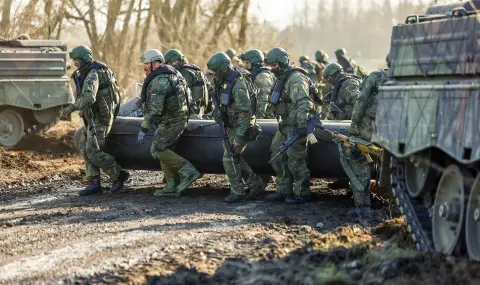"It will take Germany about 100 years to recover its previous stockpile of weapons" - this impressive headline made the rounds in the German media following the publication of the study on German defense spending. Its authors claim that the largest economy from the European Union is still unacceptably behind in the arms race with Russia, despite having created a special fund for the rearmament of the Bundeswehr in the amount of 100 billion euros.
How the Bundeswehr was toughened under Angela Merkel
There are two interesting aspects in the study under the title “Capability after decades: Germany arming too slowly in the face of the Russian threat”. On the one hand, researchers at the Kiel Institute for World Economics have calculated how many years it will take Germany to rearm its army at least to the level of the beginning of this century. On the other hand, the study shows how in the last two decades (since 2004, i.e. under the rule of Angela Merkel) the Federal Republic has strongly disarmed itself.
One look at this data is enough to show how untenable Russia's propaganda thesis is that NATO's eastward expansion posed a growing military threat to it. In fact, after the former socialist countries joined the Western Defense Alliance, many of the members of the alliance stopped paying due attention to their defense capabilities, and Germany, which had one of the largest armies in Europe, is perhaps the most striking example for that.
If 20 years ago the Bundeswehr had nearly 2,400 battle tanks in service, in 2021 their number dropped to 339; infantry fighting vehicles - from over 2,100 have decreased to 674, combat aircraft - from 423 to 226, and howitzers – from nearly a thousand to only 121 on the eve of the Russian invasion of Ukraine.
Irresponsible approach to the needs of the army
Now the experts of the Institute of the World Economy have calculated that at the current pace of rearmament, the Bundeswehr will recover the number of guns from 2004 only in 2121, that of tanks - in 2066, of armored personnel carriers - in 2043 ., and the combat planes - in 2038.
These calculations should not be taken literally, as the nature of modern warfare is changing rapidly and it is not certain that the Bundeswehr will need as many guns and tanks in the future as it did at the turn of the century. The example of Ukraine clearly shows this.
The results of the study are a vivid illustration of how Germany is unacceptably slow to improve its defense capabilities amid the rapid expansion of Russia's military industry. Professor Guntram Wolff, head of the author's team, is much more eloquent in his assessment: “It would be careless and irresponsible to leave things as they are while we watch Russia's aggressiveness.“
What Russia is doing
The production capacity of the Russian defense industry is already so great that it would take the Russian Federation about six months to produce all the weapons currently available to the Bundeswehr, the Kiel researchers also claim. According to their calculations, Russia has managed to triple the production of tanks and increase the production of unmanned aerial vehicles (drones) sixfold since its invasion of Ukraine in February 2022.
Thanks to support from North Korea, the Russian military is able to expend approximately 10,000 shells and missiles each day. If the Bundeswehr was wasting its ammunition at the same rate, the annual production in the German weapons factories would be enough for it in just 70 days. At the same time, it is clear that in the event of a ceasefire in Ukraine, Russian military stockpiles will begin to grow at an unprecedented rate, warns the Institute for the World Economy.
80 billion euros per year for defense
Professor Guntram Wolf formulated the main conclusion of the study as follows: “Russia is becoming an increasingly serious threat to the security of NATO countries. At the same time, we are too slow to acquire the weapons necessary for deterrence. Therefore, according to the scientist, Germany needs, beyond the one-time emergency fund of 100 billion euros, an immediate, significant and long-term increase in current defense spending to at least 2% of GDP, which would be in the interest of all of Europe.< /p>
The study also indicates the specific amount for this: from 2025 onwards, Germany must give 80 billion euros per year for defense.
Author: Andrey Gurkov
